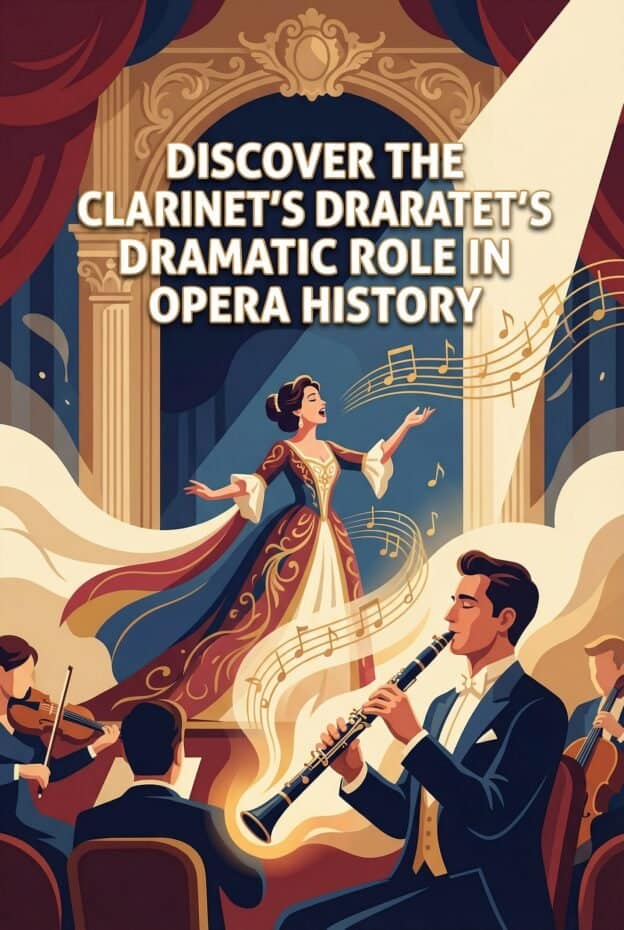The clarinet's role in opera began in the late 18th century with composers like Wolfgang Amadeus Mozart, expanded dramatically in the 19th century with Carl Maria von Weber, Gioachino Rossini, and Giuseppe Verdi, and remains important in 20th and 21st century works by Benjamin Britten and Alban Berg. Its wide range, flexible color, and legato phrasing allow it to function like an additional singing voice, often carrying lyrical solos, doubling vocal lines, and shaping dramatic atmosphere.
What is the clarinet's role in opera?
In opera, the clarinet functions as a vocal partner inside the orchestra. It often doubles or anticipates vocal lines, comments on the drama between phrases, and provides lyrical solos that mirror the emotional state of the characters. Composers use its color to bridge strings, voices, and other woodwinds in the pit.
Clarinet parts in opera typically cover three main functions: melodic solos, coloristic inner lines, and harmonic support. A clarinetist may play exposed cantabile phrases, short expressive interjections between sung lines, or soft sustained harmony under recitative. The instrument's agility also makes it ideal for comic patter and fast orchestral figures in buffa scenes.
Because of its voice-like range, the clarinet often shadows specific voice types. In 19th century Italian opera, the A clarinet frequently doubles soprano or tenor lines, while the B-flat clarinet reinforces ensembles and tuttis. In later works, such as those by Benjamin Britten, the clarinet can act as a psychological narrator through color and motif.
Historical timeline: late 18th century to modern opera
The clarinet entered the operatic world in the late 18th century as the instrument's keywork and intonation improved. Earlier Baroque opera relied more on oboes and bassoons. By the 1770s and 1780s, clarinets appeared in works by composers like Christoph Willibald Gluck and then more prominently in Mozart's mature operas.
Mozart's “Die Zauberflöte” (The Magic Flute, 1791) and “Le nozze di Figaro” (The Marriage of Figaro, 1786) show early examples of expressive clarinet writing in opera. He used the clarinet for warm, lyrical lines and as a bridge between woodwinds and voices. This set a model for later Classical and early Romantic composers.
In the early 19th century, the clarinet became central to German Romantic opera. Carl Maria von Weber's “Der Freischütz” (1821) uses clarinets for both rustic color and supernatural atmosphere. Around the same time, Gioachino Rossini integrated agile clarinet writing into Italian opera buffa, especially in “Il barbiere di Siviglia” (The Barber of Seville, 1816).
By the mid 19th century, Giuseppe Verdi and his contemporaries treated the clarinet as a primary color in the pit. Operas such as “La Traviata” (1853) and “Rigoletto” (1851) feature clarinet solos that match the intensity of the vocal writing. The instrument's role expanded from occasional color to a consistent expressive voice across acts.
In the 20th century, composers like Alban Berg and Benjamin Britten used the clarinet to explore psychological depth and modern harmony. Berg's “Wozzeck” (1925) and “Lulu” (premiered 1937, completed later) include intense, angular clarinet lines. Britten's “Peter Grimes” (1945) and “The Turn of the Screw” (1954) rely on clarinet color for atmosphere and character motifs.
Contemporary opera in the late 20th and 21st centuries continues this trajectory. Composers such as John Adams, Kaija Saariaho, and Thomas Adès write demanding clarinet parts that include extended techniques, extreme dynamics, and complex rhythmic interplay with voices. The instrument remains a core member of the operatic woodwind section.
Key composers and signature operatic examples
Several composers define the clarinet's operatic identity. For Classical style, Wolfgang Amadeus Mozart is foundational. In “The Magic Flute,” clarinets support Papageno's rustic character and provide lyrical lines in the ensembles. In “Don Giovanni” (1787), clarinets contribute to both elegance and menace in the orchestral texture.
Carl Maria von Weber's “Der Freischütz” is a landmark for Romantic clarinet writing in opera. The clarinet helps paint the forest setting and supernatural Wolf's Glen scene. Weber exploits the instrument's dark chalumeau register and bright clarion register to underline shifts between folk innocence and horror.
Gioachino Rossini uses clarinets for agility and wit. In “The Barber of Seville,” the clarinet often participates in rapid figurations that match the vocal fireworks of Figaro and Rosina. The instrument helps articulate Rossini crescendos and supports the rhythmic energy of the ensembles.
Giuseppe Verdi gives the clarinet a more explicitly vocal role. In “La Traviata,” the clarinet often doubles or comments on Violetta's lines, especially in Act I and Act III. In “Aida” (1871) and “Otello” (1887), Verdi uses clarinets to shape long lyrical arcs and to color key dramatic moments with warm inner voices.
In the 20th century, Benjamin Britten stands out. In “Peter Grimes,” clarinets help define the sea atmosphere and the psychological tension of the title character. In “Billy Budd” (1951), the clarinet lines interact closely with male voices, often mirroring their intervals and phrasing. Britten's writing demands precise control of color and dynamics.
Alban Berg's “Wozzeck” and “Lulu” push the clarinet into expressionist territory. The instrument participates in complex motivic webs and extreme dynamic contrasts. Clarinetists must navigate wide leaps, sudden register changes, and intense lyrical passages that parallel the fractured psychology of the characters.
Musical characteristics: tone, range, and the ‘voice-like' quality
The clarinet's operatic power comes from its flexible tone and wide range. Standard orchestral clarinets in B-flat and A cover a written range from approximately E3 to C7, with many operatic parts using at least three octaves. This allows the instrument to align with soprano, mezzo, tenor, and baritone tessituras at different times.
The chalumeau register (low E3 to about G4 written) provides a dark, covered sound that resembles a low contralto or baritone color. Composers like Weber and Verdi use this register for mystery, sorrow, or dramatic tension. In the pit, this register blends well with lower strings and bassoons while still projecting clearly.
The clarion register (roughly A4 to C6 written) is the most overtly vocal. Its bright yet warm timbre parallels lyric soprano and tenor voices. Many operatic solos sit in this range, where legato, vibrato control, and dynamic nuance are important. Rossini and Britten often place expressive lines here to cut through the orchestral texture.
The altissimo register (above C6 written) appears less frequently in 19th century opera but becomes more common in 20th century works. Berg and later composers use it for intensity, hysteria, or piercing color. Clarinetists must manage intonation and color carefully so that these notes serve the drama without sounding shrill.
The instrument's single reed and cylindrical bore allow for extremely smooth legato and subtle dynamic shaping. This enables the clarinet to imitate portamento-like vocal gestures through careful finger coordination and air support, even without actual pitch slides. Composers exploit this for sighs, appoggiaturas, and long lyrical arches.
Mouthpiece and reed choices also shape the voice-like quality. In opera, many clarinetists prefer mouthpieces that favor a warm, centered tone over extreme projection. Medium-strength reeds, well balanced and broken in, help produce a singing sound that can blend with strings and voices while still carrying important solos.
Performance considerations for operatic clarinetists
Playing clarinet in opera requires different priorities than in symphonic work. The clarinetist must think like a singer and a chamber musician at the same time. Phrasing should follow the vocal line, even when the clarinet part is independent. Breathing, articulation, and rubato need to align with the conductor's interpretation of the text.
Register management is central. Many operatic lines cross the break between throat tones and clarion (around written B4 to C5). Smooth crossing demands careful voicing, relaxed fingers, and consistent air. In lyrical passages, avoid accenting the break; in dramatic writing, a slight color change can be used intentionally as an expressive device.
Articulation must match the language of the opera. In Italian repertoire, light, clear tonguing supports fast patter and sparkling ensembles. In German Romantic opera, slightly broader articulation can support heavier orchestral textures. In Britten and Berg, precise, clean attacks help clarify complex rhythms and motivic structures.
Dynamic control in the pit is a constant challenge. Clarinetists must project enough to be heard under singers in climaxes but also play true pianissimo under recitative. Use a focused core to the sound at all dynamics, avoiding spread tone when playing softly. Practice crescendos and diminuendos over wide intervals, as often required in Verdi and Britten.
Mouthpiece and reed setup for opera should prioritize stability and color flexibility. Many players choose a slightly more open mouthpiece paired with a reed strength that allows easy response at soft dynamics. The goal is to shape long lines without fatigue over multi-hour performances and extended runs of the same production.
Communication with the conductor and singers is important. Watch for cues on rubato, fermatas, and cadential delays. In passages that double or answer a vocal line, listen closely to vowel color and consonant placement. Shape your attacks and releases to sound like part of the same phrase, not a separate instrumental layer.
Gaps in existing literature – missing technical and workshop details
Many historical overviews of the clarinet in opera focus on composers and famous solos but omit practical workshop-level guidance. Conservatory students often know that Verdi or Britten wrote important clarinet parts yet lack specific strategies for reed setup, pit acoustics, or managing fatigue across long acts.
Scholarly articles tend to analyze orchestration and thematic use without addressing how a player should balance projection against blend in a real opera house. Topics like choosing between B-flat and A clarinet for borderline parts, or adjusting fingerings for tricky throat-tone passages, rarely appear in standard histories.
There is also limited published material on maintenance routines tailored to opera. Clarinetists in long production runs face unique issues: sticky pads from humid pits, cork compression from frequent assembly, and reed rotation across many consecutive performances. These practical concerns often get passed down orally rather than documented.
Another gap involves annotated operatic excerpts. While orchestral audition books include symphonic staples, they seldom provide detailed commentary on operatic solos. Clarinetists preparing for opera auditions must often create their own markings, compare editions, and infer stylistic choices from vocal scores and recordings.
Finally, few resources connect archival research with performance practice. Knowing that a certain clarinet solo was written for a specific player or instrument type can inform choices about color, vibrato use, and tempo flexibility. Bridging this gap between scholarship and daily practice would benefit advanced students and professionals alike.
Maintenance and troubleshooting for opera performances
Opera work subjects the clarinet to long hours, quick turnarounds, and variable pit conditions. A structured maintenance routine reduces the risk of technical failures during performances. Clarinetists should treat instrument care as part of their artistic preparation, not an afterthought.
Before a production run, schedule a full checkup with a qualified technician. Ask for close inspection of pads, springs, and tenon fit, with special attention to low-register sealing and throat-tone venting. Opera parts often sit in soft low dynamics where even small leaks can cause instability or response problems.
Develop a reed rotation system specifically for opera. Break in several reeds over a week, playing them gently for short sessions. Label them and rotate during rehearsals to identify stable options for performance. Reserve 3 to 5 reliable reeds for each week of shows, keeping backups in a humidity-controlled case.
On performance days, warm the clarinet gradually. Assemble the instrument, then play long tones and slow scales for at least 10 to 15 minutes before entering the pit. This stabilizes pitch and reduces the risk of cracks in wooden instruments, especially in cold or air-conditioned theaters.
Just before the downbeat, check keywork silently: press low E, F, and throat tones to confirm smooth motion and no sticking. Lightly dust sticky pads with cigarette paper or dedicated pad paper, avoiding excessive powder. Verify that tenons are fully seated and that the barrel is aligned for comfortable hand position in tight pit spaces.
During long acts, use tacet measures to swab the bore discreetly. Moisture buildup can cause gurgling and sticky pads at critical entrances. Keep a small cloth handy to wipe hands if the pit is warm and humid, since sweat can affect grip and key control. After each show, swab thoroughly, dry the tenons, and store the instrument in a stable environment.
Troubleshooting common pit problems
Squeaks and unwanted register jumps are among the most disruptive issues in opera pits. They often occur at soft dynamics or when entering after long rests. To reduce risk, prepare entrances by silently fingering the first note and setting the embouchure before blowing, especially in exposed solos in Verdi or Britten.
If squeaks persist across the break, check for loose embouchure support, inconsistent air, or minor leaks around the A and register key. In the short term, slightly increase air speed and firm the lower lip. After the show, test for leaks with a feeler gauge or leak light and consult a technician if needed.
Tuning between B-flat and A clarinets can be tricky in opera, where temperature shifts during long acts. Use a consistent barrel length for each instrument and adjust mainly with embouchure and voicing during the performance. Tune carefully to the oboe and listen constantly to the singers, who may drift slightly under stage conditions.
Balancing projection with blend is another challenge. If you cannot hear yourself clearly in the pit, resist the urge to overblow. Instead, focus the air stream and slightly darken the vowel shape in your oral cavity. Ask colleagues or the conductor during rehearsal whether your sound carries adequately to the hall.
Sticky pads often appear in humid pits or during long runs. For emergency fixes, use clean cigarette paper under the pad, gently closing the key and pulling the paper out to remove residue. Avoid aggressive powders that can build up over time. Between shows, a technician can adjust pad height or replace problematic pads.
When something goes wrong mid-performance, prioritize musical continuity. If a key sticks or a note will not speak, quickly choose an alternate fingering or drop an octave rather than forcing a failed note. Opera is a live, collaborative art form; maintaining the flow of the scene is more important than perfect execution of a single pitch.
Recommended repertoire and audition-ready excerpts
Clarinetists aiming for opera work should know key excerpts that showcase lyricism, blend, and technical control. While each company may have its own list, several operatic passages appear frequently in auditions or rehearsals as benchmarks of style and reliability in the pit.
Mozart's operas provide Classical style foundations. Excerpts from “The Magic Flute” and “The Marriage of Figaro” test elegant phrasing, clean articulation, and classical balance. Focus on inner lines that support the singers rather than only on obvious solos, since much of operatic work involves subtle accompaniment.
From Weber's “Der Freischütz,” clarinetists should study passages in the overture and the Wolf's Glen scene. These excerpts require control of dark chalumeau color, smooth register transitions, and precise intonation in exposed textures. They also demonstrate the ability to create atmosphere without overpowering the ensemble.
Rossini's “The Barber of Seville” offers agile, articulated lines that mirror vocal fireworks. Practice fast runs, staccato figures, and dynamic swells that match the singers' phrasing. Conductors often listen for rhythmic stability and the ability to support the comic timing of the scene.
Verdi's “La Traviata” and “Rigoletto” contain lyrical clarinet solos that are ideal audition material. These excerpts test sustained legato, expressive vibrato (if used), and nuanced rubato. Clarinetists must show that they can phrase like a singer, breathing in logical places and shaping lines toward textual cadences.
For 20th century style, Britten's “Peter Grimes” and “Billy Budd” provide challenging excerpts with complex rhythms and subtle color changes. Berg's “Wozzeck” adds atonal lines and extreme dynamics. Mastering these passages signals readiness for modern opera repertoire and the ability to handle psychologically intense music.
Martin Freres and historical clarinet craftsmanship (brand history only)
Across the 19th and early 20th centuries, clarinet makers contributed significantly to the instrument's operatic evolution. Improved keywork, more stable intonation, and refined bores allowed composers to write more demanding parts with confidence that players could execute them reliably in the theater.
Martin Freres, active in the French woodwind tradition, produced clarinets during a period when opera houses in Paris, Brussels, and other European centers were expanding their orchestras. Instruments from this era often show design features aimed at smooth legato and secure intonation, qualities prized by operatic clarinetists.
Historical Martin Freres clarinets reveal the transition from simple-system to more advanced keywork. Surviving examples display careful craftsmanship in tone hole placement and key design, which supported the nuanced color shifts required in Romantic and early modern opera. These instruments helped shape the sound palette available to composers and players.
Martin Freres Archive Field Note: Examination of late 19th century Martin Freres clarinets in private collections shows consistent attention to throat-tone tuning and chalumeau response, both important for operatic repertoire by Verdi and his contemporaries. These design priorities align with the demands of soft low-register playing in opera pits of the period.
Primary archival sources and score references
Serious study of the clarinet in opera benefits from direct engagement with primary sources. Full scores and vocal scores from publishers such as Breitkopf & Härtel, Ricordi, and Boosey & Hawkes provide authoritative versions of clarinet parts. Comparing early editions with critical editions can reveal changes in orchestration and articulation.
For Mozart, Weber, and Rossini, consult critical editions that incorporate autograph manuscripts and early performance materials. These often clarify dynamics, slurs, and articulation that affect phrasing. Libraries and digital archives hold scans of original scores, allowing clarinetists to verify details that may differ from modern parts.
Verdi's operas exist in multiple versions for some works, reflecting revisions after premieres. Clarinetists should check whether their parts align with the version used by the opera company. Scholarly editions and Verdi critical projects document these differences, which can affect cues, key choices, and even instrument selection.
For Britten and Berg, publisher archives and composer foundations provide valuable context. Letters, rehearsal notes, and early recordings can illuminate intended tempos, balances, and character associations for specific motifs. Clarinetists can use this information to shape color choices and dynamic profiles in performance.
Beyond scores, contemporary reviews and orchestral parts preserved in opera house archives offer insight into historical performance practice. Marginal markings by early clarinetists, such as alternate fingerings or phrasing suggestions, can inform modern interpretations. Combining archival research with listening to historically informed recordings creates a rich foundation for artistic decisions.
Key takeaways
- The clarinet has been a central operatic voice since the late 18th century, evolving from coloristic support in Mozart to psychological depth in Britten and Berg.
- Operatic clarinet playing demands vocal-style phrasing, precise register management, and flexible dynamics tailored to singers and theater acoustics.
- Dedicated maintenance and troubleshooting routines are important for reliable performance across long production runs and demanding modern repertoire.
- Studying primary scores, critical editions, and archival materials deepens interpretive choices and connects modern players with historical practice.
FAQ
What is clarinet in opera?
Clarinet in opera refers to the instrument's specific role within the operatic orchestra, where it often functions like an additional singing voice. It doubles vocal lines, provides lyrical solos, colors dramatic scenes, and connects different sections of the orchestra while responding to the text and staging.
Which operas feature famous clarinet solos?
Notable operas with prominent clarinet solos include Mozart's “The Magic Flute” and “The Marriage of Figaro,” Weber's “Der Freischütz,” Rossini's “The Barber of Seville,” Verdi's “La Traviata” and “Rigoletto,” Britten's “Peter Grimes” and “Billy Budd,” and Berg's “Wozzeck” and “Lulu.” These works showcase the clarinet's lyrical and dramatic range.
When did the clarinet first appear in opera?
The clarinet began appearing in opera in the late 18th century, as improvements in keywork and tuning made it suitable for orchestral use. By the time of Mozart's mature operas in the 1780s and 1790s, the clarinet had become a regular member of the operatic woodwind section.
How does the clarinet mimic the human voice in operatic writing?
The clarinet mimics the human voice through its wide range, smooth legato, and flexible tone color. Its chalumeau and clarion registers align with vocal tessituras, while its single reed and bore design allow for subtle dynamic shading and phrase shaping that resemble sung lines and expressive breathing.
What should a clarinetist check before an opera pit performance?
Before an opera performance, a clarinetist should check reed condition and rotation, key action and pad sealing, tenon fit, and overall tuning stability. They should warm the instrument thoroughly, test soft entrances and register crossings, confirm comfortable seating and lighting in the pit, and review key cues and exposed passages in the score.







